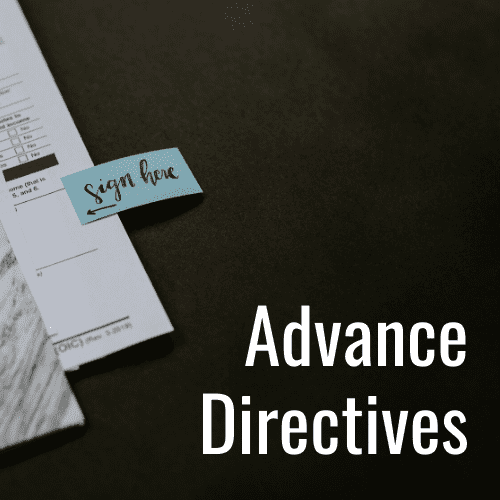Advance Directives
Tuesday July 7, 2020

End of life conversations are difficult to have. Many do not want to think about end of life for their loved ones or themselves, but these conversations are important.
There is a common myth that making end of life decisions and discussing end of life wishes will hasten death. This is NOT true. Making these decisions does not hasten death. Making decisions ensures that your loved one’s wishes are carried out. We will all die. Families fare better when decisions are made ahead of time. It is extremely difficult to make these decisions in a crisis.
According to the TN Department of Health, Advance Directives are “a written document that sets out an individual’s preferences about treatment, should the person become incompetent or unable to communicate these preferences to medical personnel. Not only are advance directives used to instruct medical personnel when to withdraw or withhold life-sustaining procedures, but they are also used to record a patient’s wish to receive all available medical treatment.”
3 Advance Directives to Know About
Power of Attorney for Healthcare
This is a legal document that designates who will make healthcare decisions for an individual if he/she cannot make those decisions. A Power of Attorney for Healthcare must be completed while a person is still able to make decisions. If this legal document is not prepared in a timely manner, your loved one with dementia may no longer be able to make his/her wishes known. If this is the case, you will need to go through court proceedings to have conservatorship established.
We strongly recommend everyone with memory impairment have a power of attorney for healthcare. It will be very difficult for you to make any kind of decisions for your loved one without this.
Living Will
This is a legal document that outlines a person’s wishes. It indicates if the person wants artificial nutrition, life support, or other medical intervention. The living will has a magic word: If. “If I am in a permanent unconscious state, then…” or “If I have a terminal condition, then…”
*A side note for those whose loved one is enrolled at Page Robbins: We are not physicians, so we do not determine “ifs.” We are not able to make those decisions. A physician can determine to withhold lifesaving measures based on a living will. If you do not want us to do CPR on your loved one, we will need a POST form, not a living will.
POST Form (Physician’s Order of Scope of Treatment)
This is a one-page document that is discussed with and then signed by a physician, making it a physician’s order. This form is completed based on your loved one’s wishes, best interests, and medical needs. Once completed, this form allows those who are caring for your loved one to quickly know what to do concerning CPR, medical interventions, and artificial nutrition. Once this form is signed by the physician and the individual or healthcare surrogate, it is official.
Making these decisions ahead of time can provide great comfort in a crisis. You will know that your loved one’s wishes are going to be honored.
And please know that you and your loved one can change your mind. Your loved one may decide that he/she wants CPR, and later as new illnesses arise, he/she may want to be considered a Do Not Resuscitate. A new form can be completed, just be sure to destroy the old ones.
It is also very important to note that forms and pre-planning are great. BUT if they are not shared with physicians and responsible parties, no one will know they exist. Give copies of these documents to physicians, designated decision makers, and family members.
It is also good to keep the forms in a place that is easy to access. In an emergency, it does no good if the POST form is buried away in a safe. Instead, put that form in an envelope and hang it on the side of the fridge, tape it inside the kitchen cabinet, and/or put a copy in the glove compartment of your car. If there is an emergency, those forms will be handy.
Page Robbins or any long-term care facility must have a copy of the POST form, so we will know whether or not to do CPR.
Again, please know that end of life discussions will not hasten death. Planning ahead can give peace in very uncertain times. There is no age requirement for these discussions. It is important for all of us, no matter our age or life situation, to think about these things and make our wishes known.
If you have questions or would like to discuss your particular situation, please contact our Social Worker, Sheri at 901-854-1200. Also, start a conversation and discuss these details with your physician.
Some Additional Resources:
Tennessee’s Information on Advance Directives
This includes a link to Tennessee’s POST form.
A good death by Beth Fahlberg, PhD, RN, CHPN
An opinion piece from a nurse and former caregiver
What Is a Good Death? How to die well. by Marilyn A. Mendoza, PhD
An opinion piece from a psychologist




